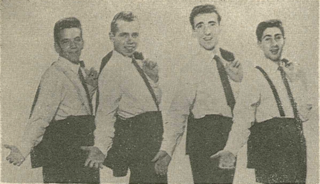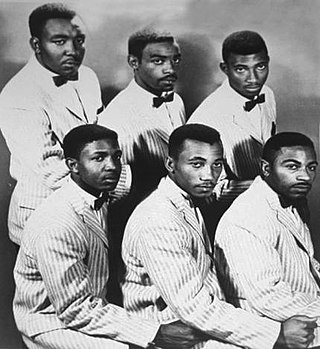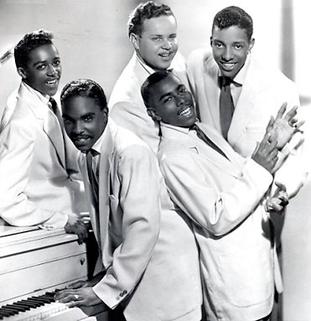Related Research Articles
The Penguins were an American doo-wop group from Los Angeles, California, that were active during the 1950s and early 1960s. They are known for their 1954 hit song, "Earth Angel", which was one of the first rhythm and blues songs to cross over to the pop charts. The song would ultimately prove to be their only success. The song peaked at No. 8 on the US Billboard Best Sellers in Stores pop chart but had a three-week run at No. 1 on the R&B chart.

Doo-wop is a subgenre of rhythm and blues music that originated in African-American communities during the 1940s, mainly in the large cities of the United States, including New York, Philadelphia, Pittsburgh, Chicago, Baltimore, Newark, Detroit, Washington, D.C., and Los Angeles. It features vocal group harmony that carries an engaging melodic line to a simple beat with little or no instrumentation. Lyrics are simple, usually about love, sung by a lead vocal over background vocals, and often featuring, in the bridge, a melodramatically heartfelt recitative addressed to the beloved. Harmonic singing of nonsense syllables is a common characteristic of these songs. Gaining popularity in the 1950s, doo-wop was "artistically and commercially viable" until the early 1960s and continued to influence performers in other genres.

The Coasters are an American rhythm and blues/rock and roll vocal group who had a string of hits in the late 1950s. With hits including "Searchin'", "Young Blood", "Charlie Brown", "Poison Ivy", and "Yakety Yak", their most memorable songs were written by the songwriting and producing team of Leiber and Stoller. Although the Coasters originated outside of mainstream doo-wop, their records were so frequently imitated that they became an important part of the doo-wop legacy through the 1960s. In 1987, they were the first group inducted into the Rock and Roll Hall of Fame.

The Flamingos are an American doo-wop group formed in Chicago in 1953. The band became popular in mid-to-late 1950s and are best known for their 1959 cover version of "I Only Have Eyes for You". They have since been hailed as being one of the finest and most influential vocal groups in pop and doo wop music history. In 2001, the band was inducted into the Rock and Roll Hall of Fame.
The Regents were an American doo-wop vocal group from New York, operating in the late 1950s and early 1960s.

The Crows were an American R&B vocal group formed in 1951. They achieved commercial success and popularity during the 1950s with their debut single and only hit, "Gee". The single, released in June 1953, has been credited with being the first rock and roll hit by a rock and roll group. It peaked at position number 14 and number 2, respectively, on the Billboard pop and R&B charts in 1954. Although Gee fell into the doo-wop genre, and "was the first 1950s doo-wop record to sell over one million records" in that genre, some consider it as the first of the "rock and roll records".

Danny & the Juniors was an American doo-wop and rock and roll vocal group formed in Philadelphia, Pennsylvania. Originally consisting of Danny Rapp, Dave White, Frank Maffei and Joe Terranova, the group was formed in 1955. They are best known for their 1957 no. 1 hit "At the Hop" and their 1958 follow-up hit "Rock and Roll Is Here to Stay".

The Del-Vikings were an American doo-wop musical group that recorded several hit singles in the 1950s and continued to record and tour with various lineups in later decades. The group is notable for the hit songs "Come Go with Me" and "Whispering Bells", and for having been a successful racially mixed musical group during a period of time when such groups were rare.

Maurice Williams and the Zodiacs were an American doo-wop/R&B vocal group in the late 1950s and early 1960s. Originally the (Royal) Charms, the band changed its name to the Gladiolas in 1957 and the Excellos in 1958, before finally settling on the Zodiacs in 1959.
The Jive Five were an American doo-wop group. They are best known for their debut hit single, "My True Story" (1961), the Nickelodeon bumper jingles in the 1980s and 1990s, and the fact that they outlasted most of their musical peers by re-modeling themselves as a soul group in the 1970s and beyond.

The Diamonds are a Canadian vocal quartet that rose to prominence in the 1950s and early 1960s with 16 Billboard hit records. The original members were Dave Somerville (lead), Ted Kowalski (tenor), Phil Levitt (baritone), and Bill Reed (bass). They were most noted for interpreting and introducing rhythm and blues vocal group music to the wider pop music audience. Contrary to a popular myth, the father of Tom Hanks was never a member of the group.

The Chords were an American doo-wop vocal group formed in 1951 in The Bronx, New York, known for their 1954 hit "Sh-Boom", which they wrote. It is the only song they created that reached mainstream popularity.

"The Wanderer" is a song written by Ernie Maresca and originally recorded by Dion, released on his 1961 album, Runaround Sue. The song, with a 12-bar blues-base verse and an eight-bar bridge, tells the story of a travelling man and his many loves. The song is ranked number 243 on the Rolling Stone magazine's list of The 500 Greatest Songs of All Time.
The Del-Satins were an American vocal group, most active in the early 1960s, who recorded on their own but are best remembered for their harmonies on hit records for Dion and others. They have been described as having "few peers as practitioners of white doo-wop."

The Capris are an American doo wop group who became a one-hit wonder in 1961 with "There's a Moon Out Tonight." They experienced a popularity and performing resurgence in the 1980s, when three members reformed and The Manhattan Transfer recorded their song, "Morse Code of Love," which reached the US Hot 100 and the U.S. AC top 20.

The Solitaires were an American doo-wop group, best known for their 1957 hit single "Walking Along". Although they never had a national chart hit, they were one of the most popular vocal groups in New York in the late 1950s.
The Innocents were an American pop group from Sun Valley, California, United States. The trio existed primarily between 1958 and 1964, although they did reform in the 1990s.
"It's Too Soon to Know" is an American doo-wop ballad by Deborah Chessler (1923–2012), performed first by The Orioles. It was number one on the American Rhythm and blues charts in November 1948. It is considered by some to be the first "rock and roll" song, and described by others as "the first rhythm and blues vocal group harmony recording".
Joseph Cook, known as Little Joe Cook, was an American rhythm and blues singer and songwriter. He is best known as the lead singer of Little Joe & The Thrillers, whose song "Peanuts" reached No. 22 on the Billboard Top 100 and No. 4 in Canada in 1957.
The Hollywood Saxons were a Los Angeles R&B group who recorded under various other names. They were well known on the LA R&B circuit. Their recording history ran from the late 1950s to the late 1960s. Their discography is complex due to the various names they recorded under and labels they recorded on.
References
- ↑ Anthony M. Musso (2008). Setting the Record Straight: The Music and Careers of Recording Artists from the 1950s and Early 1960s ... In Their Own Words. AuthorHouse. pp. 93–97. ISBN 9781438952925.
- 1 2 Joe Favale & the Emotions, Biography. Emotionsecho.com, Retrieved 19 April 2016
- 1 2 The Emotions Biography, Doo-Wop Groups. Doo-wop.blogg.org, Retrieved 19 April 2016
- ↑ Whitburn, Joel (2003). Top Pop Singles 1955-2002 (1st ed.). Menomonee Falls, Wisconsin: Record Research Inc. p. 225. ISBN 0-89820-155-1.